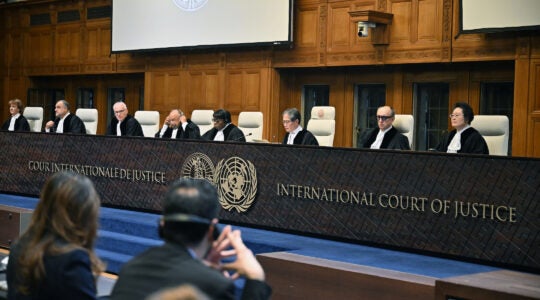RAHAT, Israel (JTA) — On an August weekday afternoon, 19-year-old Mohammed Kernowi stands in front of a small store in Israel’s largest Bedouin city, a hot plate in front of him with small pancakes sizzling in preparation for the end of that day’s Ramadan fast.
At his age, many Israeli men have been through basic training and are weathering their first of three years of compulsory military service either on the country’s borders, in the West Bank, in an office or on one of the country’s many bases.
Kernowi, however, prefers baking to bullets.
“No one goes from our family,” he said. “It’s a waste of three years of your life.”
While some Bedouins continue to voluntarily serve in Israel’s military, their community — just as with some in Israel’s Jewish community — debate whether it is worthwhile. Bedouins, separated physically and to some extent culturally from other Israeli Arabs, are exempt from serving in the Israel Defense Forces.
There are about 250,000 Bedouins in the country, according to Israeli government figures. The IDF could not provide an estimate of the army’s current Bedouin population, but Doron Almog, head of Israel’s Bedouin Improvement Program Staff, estimates that half a percentage of eligible Bedouins head to the army.
Army service has been a defining part of Israeli public life; many Jewish Israelis make professional connections they use throughout their civilian careers. But the debate about who should serve in the IDF has become especially heated this summer.
This month, the Israeli army officially began drafting young haredi Orthodox men when no new compromise legislation was passed by lawmakers about their service. In February, the Israeli Supreme Court had struck down the law that exempted the haredim from serving and mandated that they serve in either the military or civilian volunteer organizations.
A faction of the Israeli Knesset is demanding that Arabs be required to serve as well. A month ago, the leader of Israel’s nationalist Yisrael Beiteinu party, Avigdor Lieberman, submitted a bill to the Knesset that would have required all Israelis, regardless of background, to be drafted. The bill was voted down, and Lieberman incurred protests from Israeli-Arab leaders.
Kernowi complains that Negev Bedouins receive “no equality, no respect” from Jewish Israelis — a claim that is echoed by other Bedouins who also lament lackluster education and employment programs in Rahat. Another source of resentment toward the state are the IDF demolitions in recent years of unrecognized Bedouin villages in the Negev. Bedouin leaders say the villages are part of the seminomadic Bedouin culture; the Israeli government maintains they are illegal.
Despite the complaints, some Bedouins serve readily and with distinction. Several sound no different than the most patriotic Jewish Israelis in describing the obligation they feel to serve the country, no matter how Israel treats their communities.
“We live in the state and we should give to it,” said Sammy, 35, who joined the army (legally) at age 16 1/2. “I wanted to give the state three years.”
But Sammy, who works in a Rahat grocery store, also says he regrets his time in the IDF.
“I don’t see any value,” he said. “It didn’t help my life. It would be better if there were equality. There’s no equality even between Jews.”
On one complaint — the lack of education — Col. Ahmed Ramiz, the head of the IDF’s minority department and himself a Bedouin, says army service can help. He says the IDF provides Bedouin soldiers the opportunity to advance their careers, in part by offering trade courses to soldiers along with scholarships.
Ramiz adds that unemployment among Bedouins is due to their location rather than their ethnicity.
“The unemployment exists in the North and South,” the regions where Bedouins live, he said. “The soldiers, if they want to serve, they can learn. We give them an opportunity to work and enter society.”
Data from the government’s Israel Employment Service, however, show that Rahat’s unemployment rate is far higher than those of nearby predominantly Jewish cities. In April, Rahat’s unemployment rate was 29.2 percent, while those of the surrounding Beersheva, Ofakim and Netivot were 7.2, 12.7 and 8.2 percent, respectively.
The IDF also offers Bedouin veterans who come from unrecognized villages priority in government resettlement programs that relocate the villagers to government-sanctioned residences.
While Sammy says his IDF’s opportunities passed him by, another resident of Rahat, Ibrahim Abuzayid, believes the IDF is the Bedouins’ best shot at equality in Israeli society — though he also is frustrated with what he sees as government anti-Bedouin discrimination. As the head of the Bedouin branch of the Coalition for the Soldier, an Israeli aid organization, Abuzayid helps provide troops with supplies and care packages.
“In the army there’s true equality that we don’t find every day,” said Abuzayid, who fought in the 1973 Yom Kippur War. “As soon as you take off your uniform you’re nothing. Give me an agricultural plot, a dozen acres. Give me water. I don’t deserve it?”
Still, as is the case for many Bedouins, Abuzayid feels a duty to serve that he has passed on to his eight sons, all of whom did army service.
“We don’t have another state,” he said. “They don’t help the Bedouins? It’s still our state. We were born here. Our children were born here. There’s no reason not to serve.”
JTA has documented Jewish history in real-time for over a century. Keep our journalism strong by joining us in supporting independent, award-winning reporting.





